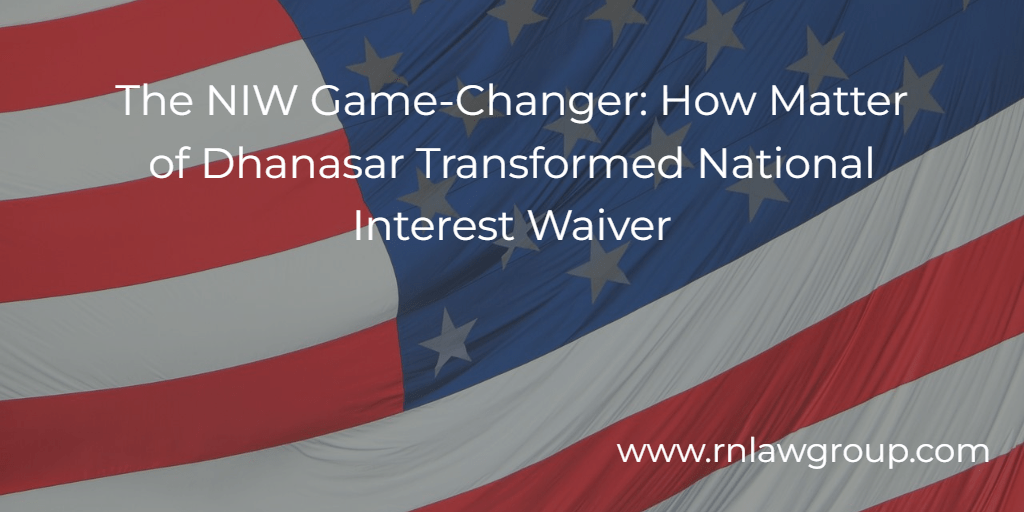
The NIW Game-Changer: How Matter of Dhanasar Transformed National Interest Waiver
The Matter of Dhanasar case changed how U.S. immigration law handles national interest waivers in a big way. This landmark decision, issued by the Administrative Appeals Office (AAO) in 2016, revolutionized the way we evaluate NIW petitions for individuals seeking to contribute their exceptional skills to the American workforce. Dhanasar not only streamlined the national interest waiver criteria but also opened new doors for talented professionals, researchers, and entrepreneurs looking to make meaningful contributions to our nation’s progress.
In this case, the petitioner was an aerospace engineering researcher seeking classification as an advanced degree professional and requesting a waiver of the job offer requirement.
The Administrative Appeals Office (AAO) took this opportunity to revise the existing framework for assessing national interest waivers. They established a new three-pronged test:
- The foreign national’s proposed endeavor has both substantial merit and national importance.
- The foreign national is well positioned to advance the proposed endeavor.
- On balance, it would be beneficial to the United States to waive the job offer and labor certification requirements.
The petitioner’s research on hypersonic propulsion systems was found to meet these criteria. His work was deemed to have substantial merit and national importance due to its potential applications in national security and space exploration. His qualifications and past successes positioned him well to advance this research. Finally, the AAO determined that waiving the job offer requirement would benefit the U.S. given the value of his contributions.
The AAO approved the petition, marking a significant change in how national interest waivers are evaluated in U.S. immigration law. The following is a detailed explanation of the three criteria:
- The foreign national’s proposed endeavor has both substantial merit and national importance:
This criterion focuses on the specific work or project the foreign national proposes to undertake.
- “Substantial merit” can be demonstrated in various fields such as business, science, technology, culture, health, or education. The endeavor doesn’t necessarily need to have immediate economic impact. For example, pure scientific research that advances human knowledge could qualify.
- “National importance” looks at the potential impact of the work. This doesn’t just mean geographic scope – a project focused on one area of the U.S. could still be nationally important. For instance, work that could significantly employ U.S. workers or have substantial positive economic effects, especially in a depressed area, might be considered nationally important.
In Dhanasar’s case, his research on hypersonic propulsion systems was deemed to have substantial merit due to its potential to advance scientific knowledge and enhance national security. It was considered nationally important because of its implications for U.S. strategic interests in defense and space technology.
- The foreign national is well positioned to advance the proposed endeavor:
This criterion shifts focus to the individual’s qualifications and likelihood of success. Factors considered include:
- Education, skills, and knowledge
- Record of success in related efforts
- A model or plan for future activities
- Progress towards achieving the proposed endeavor
- Interest from potential customers, users, investors, or other relevant entities
The AAO recognizes that many innovative endeavors may fail despite good planning and execution, so they don’t require proof that the endeavor will definitely succeed. They just need to establish that the individual is well-positioned to advance it.
For Dhanasar, his advanced degrees, experience in relevant research, and success in obtaining grants from NASA and the Department of Defense demonstrated he was well-positioned to advance his proposed research.
- On balance, it would be beneficial to the United States to waive the job offer and labor certification requirements:
This criterion involves balancing different national interests. While protecting the domestic labor supply is important (hence the usual requirement for a job offer and labor certification), sometimes other factors may outweigh this.
Factors that might be considered include:
- Whether it would be impractical for the foreign national to secure a job offer or for an employer to obtain a labor certification
- Whether the U.S. would still benefit from the foreign national’s contributions even if qualified U.S. workers are available
- Whether the national interest in the foreign national’s contributions is urgent enough to warrant bypassing the labor certification process
In Dhanasar’s case, the AAO determined that his specialized expertise and the national security implications of his work made it beneficial to the U.S. to waive these requirements, even assuming other qualified U.S. workers might be available.
This new framework aimed to provide more flexibility and clarity in evaluating national interest waiver petitions, especially for entrepreneurs and self-employed individuals who might struggle under the previous criteria.
———————————————— Chinese Version ———————————————
Dhanasar 案件极大地改变了美国移民法处理中关于国家利益豁免(NIW)的方式。2016年,美国行政上诉办公室(AAO)作出的这一里程碑式的决定,彻底改革了评估国家利益豁免申请的标准,为那些希望通过其卓越技能为美国劳动力做出贡献的个人开辟了新途径。Dhanasar 案不仅简化了国家利益豁免的标准,还为有才华的专业人士、研究人员和企业家提供了更多机会,使他们能够为国家的发展做出有意义的贡献。
Dhanasar案确立了评估某些移民签证申请中“国家利益豁免”的新框架。
申请人是一名航空航天工程研究员,寻求作为高级学位专业人员的分类,并要求豁免工作聘用要求。
行政上诉办公室(AAO)借此机会修改了现有的国家利益豁免评估框架,提出了新的三要素测试标准:
- 外国人的拟议事业具有实质性价值和国家重要性。
- 外国人具备推进该事业的良好条件。
- 综合考虑,豁免工作聘用和劳工认证要求对美国有利。
在此案中,申请人的高超音速推进系统研究被认为符合这些标准。由于其研究在国家安全和太空探索中的潜在应用,该工作被认定为具有实质性价值和国家重要性。申请人的资历和过去的成功也使其具备推进该研究的有利条件。最后,AAO认为,鉴于其贡献的价值,豁免工作聘用要求对美国有利。
AAO批准了该申请,标志着美国移民法中国家利益豁免评估方式的重大变化。
- 外国人的拟议事业具有实质性价值和国家重要性:
该标准关注外国人计划从事的具体工作或项目。
“实质性价值”可以通过多个领域展现,如商业、科学、技术、文化、健康或教育。该事业不一定需要立即产生经济影响。例如,推动人类知识进步的纯科学研究也可以符合条件。
“国家重要性”指工作潜在的影响力。这不仅仅指地理范围——即使专注于美国某一地区的项目,也可能具有国家重要性。例如,能够显著增加美国就业或对经济产生重大积极影响的工作,特别是在经济不发达地区,可能被认为具有国家重要性。
在Dhanasar案中,他的高超音速推进系统研究由于其推动科学知识进步和增强国家安全的潜力,被认为具有实质性价值。其工作由于对美国国防和太空技术战略利益的影响,被视为具有国家重要性。
- 外国人具备推进拟议事业的良好条件:
该标准转向评估个人的资历和成功的可能性。考量因素包括:
- 教育背景、技能和知识
- 相关努力中的成功记录
- 未来活动的模型或计划
- 推进拟议事业的进展
- 潜在客户、用户、投资者或其他相关实体的兴趣
AAO认识到,许多创新事业即使规划周全,仍可能失败,因此他们不要求证明该事业一定会成功。他们只需确认该个人具备推进事业的良好条件。
对于Dhanasar来说,他的高级学位、相关研究经验以及从NASA和国防部获得资助的成功经历,证明他具备推进其研究的有利条件。
- 综合考虑,豁免工作聘用和劳工认证要求对美国有利:
该标准涉及平衡不同的国家利益。虽然保护国内劳动力市场很重要(因此通常要求提供工作聘用和劳工认证),但有时其他因素可能超过这一考量。
可能的考量因素包括:
- 外国人是否难以获得工作聘用,或雇主是否难以获得劳工认证
- 即使有合格的美国工人,美国是否仍能从外国人的贡献中受益
- 外国人的贡献是否具有足够的国家紧迫性,以至于可以绕过劳工认证程序
在Dhanasar案中,AAO认为,他的专业知识以及其工作对国家安全的影响,使得即便假设有其他合格的美国工人,豁免这些要求对美国仍有利。
这一新框架旨在为评估国家利益豁免申请提供更多灵活性和明确性,特别是针对那些在以往标准下可能面临困难的企业家和自雇人士。
By: Jiaqi Ji
Jiaqi Ji is an Associate Attorney at Reddy Neumann Brown PC who primarily focuses on employment-based non-immigrant visa cases. Jiaqi was born and raised in China, consequently she is fluent in both English & Chinese. She came to the United States for higher legal education and went through the employment-based immigration process with her spouse. Jiaqi earned her Juris Doctor from George Washington University Law School in 2024.

